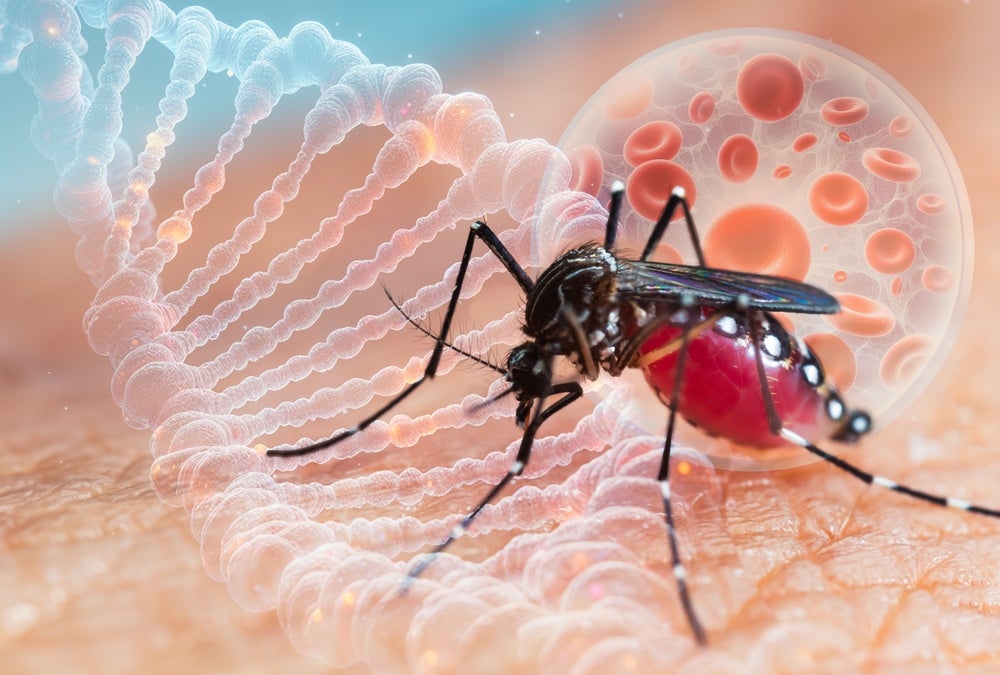
GanLum achieved a 97.4% PCR-corrected cure rate compared to 94% with standard of care, meeting the trials primary endpoint of non-inferiority. Image credit: frank60 / Shutterstock.com
Novartis’ anti-malaria drug could mark the first major advancement in more than 25 years after it showed non-inferiority in a Phase III trial.
The Swiss pharma company compared GanLum (ganaplacide/lumefantrine), a novel non-artemisinin antimalarial, against its already approved malaria treatment, Coartem (artemether/lumefantrine), in 1,688 adults and children diagnosed with malaria across 34 sites in 12 African countries where the disease is prevalent.

Combine business intelligence and editorial excellence to reach engaged professionals across 36 leading media platforms.
In the KALUMA study (NCT05842954), treatment with GanLum achieved a 97.4% PCR-corrected cure rate compared to 94% with standard of care, meeting the trials primary endpoint of non-inferiority. This equates to cure rates of 99.2% and 96.7% respectively, based on conventional per protocol analysis.
Additional analysis shows that GanLum is also highly effective against mutant malaria parasites associated with partial drug resistance, as well as having a rapid response against mature gametocytes, the sexual stage of the parasite’s lifecycle responsible for onward transmission.
GanLum, which was developed with Medicines for Malaria Venture (MMV), is administered as a sachet of granules once a day for three days. It is a combination of a new antimalarial drug, ganaplacide, and a new formulation of an existing antimalarial, lumefantrine. Ganaplacide acts by disrupting the parasite’s internal protein transport systems, which are essential for its survival inside red blood cells.
Dr Abdoulaye Djimdé, professor of parasitology and mycology at the University of Science, Techniques and Technologies of Bamako, Mali, said: “GanLum could represent the biggest advance in malaria treatment for decades, with high efficacy against multiple forms of the parasite as well as the ability to kill mutant strains that are showing signs of resistance to current medicines. Drug resistance is a growing threat to Africa, so new treatment options can’t come a moment too soon.”
Based on the Phase III data, Novartis plans to seek regulatory approval from health authorities for GanLum, with the company adding that it could mark the first major innovation in malaria treatment since artemisinin-based combination therapies, the current gold standard treatments, were introduced more than 25 years ago.
The drug was granted Fast Track Designation and Orphan Drug Designation by the US Food and Drug Administration (FDA) in 2022.
The findings come amid urgent calls to tackle the growing threat of antimalarial drug resistance in Africa. Data were presented at the American Society of Tropical Medicine and Hygiene annual meeting 2025.
Vaccine field also looks promising
There could also be good news in the vaccine field for malaria, as RH5.1/Matrix-M has shown potential as the first blood-stage vaccine in a Phase IIb trial. The trial, conducted by researchers in Burkina Faso and the UK, found RH5.1/Matrix-M 55% effective against clinical malaria when administered in a delayed third-dose regimen. It also demonstrated 80% efficacy against high levels of malaria parasites.
Commenting on the Phase IIb trial in December 2024, GlobalData infectious disease analyst Stephanie Kurdach said: “RH5.1/Matrix-M has the potential to be the first blood-stage malaria vaccine brought to market. This could be a much-needed addition to the currently available malaria vaccines and provide an important second line of defence for those most at risk of contracting malaria.”
If approved, the vaccine could be part of a broader malaria vaccine strategy, complementing pre-erythrocytic vaccines, which work by targeting the early sporozoite stage of the parasite. Currently approved vaccines are GSK’s Mosquirix, which was endorsed by the World Health Organization (WHO) in 2021 and Serum Institute of India’s R21/Matrix-M, which gained WHO recommendation in 2023.
BioNTech is also investigating an mRNA vaccine for malaria, BNT165e in a Phase I/IIa trial (NCT06069544). The study was put on a clinical hold by the FDA earlier in 2025 but this has since been lifted. The study is due to complete in March 2026, according to ClinicalTrials.gov.
Sign up for our daily news round-up!
Give your business an edge with our leading industry insights.
Clinical Trials Arena Excellence Awards – The Benefits of Entering
Gain the recognition you deserve! The Clinical Trials Arena Excellence Awards celebrate innovation, leadership, and impact. By entering, you showcase your achievements, elevate your industry profile, and position yourself among top leaders driving clinical trials industry advancements. Don’t miss your chance to stand out—submit your entry today!


